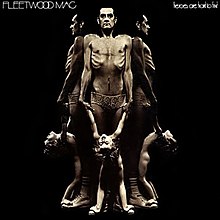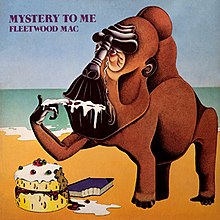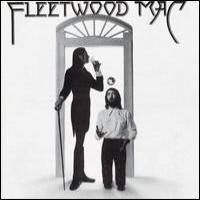
Rock and roll music
| Heroes Are Hard to Find | ||||
|---|---|---|---|---|
 | ||||
| Studio album by | ||||
| Released | 13 September 1974 | |||
| Recorded | July 1974 | |||
| Studio | Angel City Sound, Los Angeles | |||
| Genre | ||||
| Length | 39:26 | |||
| Label | Reprise | |||
| Producer | Fleetwood Mac, Bob Hughes | |||
| Fleetwood Mac chronology | ||||
| ||||
Heroes Are Hard to Find · Channel: Fleetwood Mac - Topic · 3m 36s


I'm Coming Home To Stay · Channel: Fleetwood Mac - Topic · 2m 29s

Angel (2015 Remaster) · Channel: Fleetwood Mac - Topic · 4m 55s

Fleetwood Mac - Bermuda Triangle · Channel: Bronwyn Douwsma · 10m 11s

Fleetwood Mac Come A Little Bit Closer · Channel: Felix Rock dj · 4m 49s

Fleetwood Mac - She's Changing Me · Channel: moonlitknight009 · 3m 2s

Bad Loser · Channel: Fleetwood Mac - Topic · 3m 26s

Silver Heels · Channel: Fleetwood Mac - Topic · 3m 28s

Fleetwood Mac~Prove Your Love · Channel: evie1942 · 3m 53s

Fleetwood Mac - Born Enchanter · Channel: moonlitknight009 · 2m 57s

Safe Harbour · Channel: Fleetwood Mac - Topic · 2m 31s

Heroes Are Hard to Find (Single) (2018 Remaster) · Channel: Fleetwood Mac - Topic · 2m 47s

Álbums chronology
Heroes Are Hard To Find
Fleetwood Mac
Discográfica: Reprise · Estudio de grabación: Angel City Sound, Los Angeles · Productor: Fleetwood Mac , Bob Hughes
1974 studio album by Fleetwood Mac
Heroes Are Hard to Find is the ninth studio album by the British-American rock band Fleetwood Mac, released on 13 September 1974. This is the last album recorded with Bob Welch, who left the band at the end of 1974. It was the first Fleetwood Mac studio album recorded in the United States, in Los Angeles.
Leer másReview
1974 studio album by Fleetwood Mac
Heroes Are Hard to Find is the ninth studio album by the British-American rock band Fleetwood Mac, released on 13 September 1974. This is the last album recorded with Bob Welch, who left the band at the end of 1974. It was the first Fleetwood Mac studio album recorded in the United States, in Los Angeles.
Leer másBackground
The album was recorded during a low point for the group, with Bob Weston`s affair with drummer Mick Fleetwood`s wife causing a temporary disbandment, which led to subsequent legal problems when manager Clifford Davis organized a completely new lineup using the Fleetwood Mac name to fulfill their remaining tour dates.[2] Welch convinced the band to relocate to America so they could be closer to their record label. Christine McVie was initially hesitant, but agreed to travel with the band to Los Angeles.[3] The band secured an injunction that prevented the fake Fleetwood Mac from performing, although Davis also won an injunction that temporarily barred the lineup of Fleetwood, the McVies, and Welch from touring or releasing any new music.[4] Through the help of concert promoter Bill Graham, the lineup of Fleetwood, the McVies, and Welch managed to convince Warner Brothers that they were the real Fleetwood Mac and negotiated a new contract with the label that allowed them to release and perform music under the name Fleetwood Mac. The legal dispute with Davis was eventually settled out of court in 1978.[5]
The title track was edited and issued as a single but it failed to chart. Even without a successful single to support the album, it still managed to peak at No. 34 on the Billboard 200 chart, which at the time was the highest Billboard placing for any Fleetwood Mac album.[6] It also reached No. 5 on the Billboard FM Action chart.[7]
Bob Welch later re-recorded "Angel", "Bermuda Triangle" and "Silver Heels" for His Fleetwood Mac Years & Beyond (2003). A re-write of "Silver Heels", titled "Hustler", with explicit lyrics appeared on Bob Welch Looks at Bop (1999).[8]
Cover art
The cover art was taken by photographer Herbie Worthington using a three-way mirror and features a shirtless Mick Fleetwood with his chest puffed out and his three year-old daughter Amelia standing on his shoes. Worthington later supplied the cover art for Fleetwood Mac and Rumours. The lace underwear worn by Fleetwood was gifted to him by a close friend.[4]
| Review scores | |
|---|---|
| Source | Rating |
| AllMusic | [9] |
| Christgau`s Record Guide | B−[10] |
| Rolling Stone | (positive)[11] |
| Rolling Stone Album Guide | [12] |
Reception
Heroes are Hard to Find received mixed reviews upon its release. Rolling Stone believed that Heroes are Hard to Find "stacked up as a pleasant album", and singled out "Prove Your Love" as "exquisitely pretty" and "Come a Little Bit Closer" as "a gorgeous tune reminiscent of the Beach Boys".[11] Robert Christgau criticized the band for succumbing to pop cliches of the early 1970s, specifically their use of a string synthesizer, pedal steel, and "half-assed horns". He dismissed Welch and McVie for sounding bored and "less than perfect" respectively and labeled Heroes are Hard to Find as their worst album to date.[10] Retrospective reviews were more positive, with Hal Horowitz of AllMusic complimenting the songwriting abilities of Welch and McVie and praising the album for being both cohesive and diverse.[9]
Track listing
| No. | Title | Writer(s) | Lead vocals | Length |
|---|---|---|---|---|
| 1. | "Heroes Are Hard to Find" | Christine McVie | C. McVie | 3:35 |
| 2. | "Coming Home" | Bob Welch | Welch | 3:55 |
| 3. | "Angel" | Welch | Welch | 3:55 |
| 4. | "Bermuda Triangle" | Welch | Welch | 4:08 |
| 5. | "Come a Little Bit Closer" | C. McVie | C. McVie | 4:48 |
| No. | Title | Writer(s) | Lead vocals | Length |
|---|---|---|---|---|
| 1. | "She`s Changing Me" | Welch | Welch | 2:58 |
| 2. | "Bad Loser" | C. McVie | C. McVie | 3:25 |
| 3. | "Silver Heels" | Welch | Welch | 3:26 |
| 4. | "Prove Your Love" | C. McVie | C. McVie | 3:57 |
| 5. | "Born Enchanter" | Welch | Welch | 2:54 |
| 6. | "Safe Harbour" | Welch | Welch | 2:32 |
| No. | Title | Writer(s) | Lead vocals | Length |
|---|---|---|---|---|
| 12. | "Heroes Are Hard to Find" (single version) | C. McVie | C. McVie | 2:47 |
Personnel
Fleetwood Mac
- Bob Welch – electric guitar, acoustic guitar, vibraphone, lead vocals, backing vocals
- Christine McVie – keyboard, ARP String Ensemble, lead vocals, backing vocals
- John McVie – bass guitar
- Mick Fleetwood – drums, percussion
Additional personnel
- Sneaky Pete Kleinow – pedal steel guitar on "Come a Little Bit Closer"
- Nick DeCaro – horn and string arrangement
Production
- Fleetwood Mac – producers
- Bob Hughes – engineer, producer
- Doug Graves – engineer, assistant engineer
- Lee Herschberg – remastering
- Desmond Strobel – design
Charts
| Chart (1974) | Peak position |
|---|---|
| Canada Top Albums/CDs (RPM)[13] | 46 |
| US Billboard 200[14] | 34 |
| Chart (2024) | Peak position |
|---|---|
| Hungarian Physical Albums (MAHASZ)[15] | 12 |
1974 studio album by Fleetwood Mac
Heroes Are Hard to Find is the ninth studio album by the British-American rock band Fleetwood Mac, released on 13 September 1974. This is the last album recorded with Bob Welch, who left the band at the end of 1974. It was the first Fleetwood Mac studio album recorded in the United States, in Los Angeles.
Background
The album was recorded during a low point for the group, with Bob Weston`s affair with drummer Mick Fleetwood`s wife causing a temporary disbandment, which led to subsequent legal problems when manager Clifford Davis organized a completely new lineup using the Fleetwood Mac name to fulfill their remaining tour dates.[2] Welch convinced the band to relocate to America so they could be closer to their record label. Christine McVie was initially hesitant, but agreed to travel with the band to Los Angeles.[3] The band secured an injunction that prevented the fake Fleetwood Mac from performing, although Davis also won an injunction that temporarily barred the lineup of Fleetwood, the McVies, and Welch from touring or releasing any new music.[4] Through the help of concert promoter Bill Graham, the lineup of Fleetwood, the McVies, and Welch managed to convince Warner Brothers that they were the real Fleetwood Mac and negotiated a new contract with the label that allowed them to release and perform music under the name Fleetwood Mac. The legal dispute with Davis was eventually settled out of court in 1978.[5]
The title track was edited and issued as a single but it failed to chart. Even without a successful single to support the album, it still managed to peak at No. 34 on the Billboard 200 chart, which at the time was the highest Billboard placing for any Fleetwood Mac album.[6] It also reached No. 5 on the Billboard FM Action chart.[7]
Bob Welch later re-recorded "Angel", "Bermuda Triangle" and "Silver Heels" for His Fleetwood Mac Years & Beyond (2003). A re-write of "Silver Heels", titled "Hustler", with explicit lyrics appeared on Bob Welch Looks at Bop (1999).[8]
Cover art
The cover art was taken by photographer Herbie Worthington using a three-way mirror and features a shirtless Mick Fleetwood with his chest puffed out and his three year-old daughter Amelia standing on his shoes. Worthington later supplied the cover art for Fleetwood Mac and Rumours. The lace underwear worn by Fleetwood was gifted to him by a close friend.[4]
| Review scores | |
|---|---|
| Source | Rating |
| AllMusic | [9] |
| Christgau`s Record Guide | B−[10] |
| Rolling Stone | (positive)[11] |
| Rolling Stone Album Guide | [12] |
Reception
Heroes are Hard to Find received mixed reviews upon its release. Rolling Stone believed that Heroes are Hard to Find "stacked up as a pleasant album", and singled out "Prove Your Love" as "exquisitely pretty" and "Come a Little Bit Closer" as "a gorgeous tune reminiscent of the Beach Boys".[11] Robert Christgau criticized the band for succumbing to pop cliches of the early 1970s, specifically their use of a string synthesizer, pedal steel, and "half-assed horns". He dismissed Welch and McVie for sounding bored and "less than perfect" respectively and labeled Heroes are Hard to Find as their worst album to date.[10] Retrospective reviews were more positive, with Hal Horowitz of AllMusic complimenting the songwriting abilities of Welch and McVie and praising the album for being both cohesive and diverse.[9]
Track listing
| No. | Title | Writer(s) | Lead vocals | Length |
|---|---|---|---|---|
| 1. | "Heroes Are Hard to Find" | Christine McVie | C. McVie | 3:35 |
| 2. | "Coming Home" | Bob Welch | Welch | 3:55 |
| 3. | "Angel" | Welch | Welch | 3:55 |
| 4. | "Bermuda Triangle" | Welch | Welch | 4:08 |
| 5. | "Come a Little Bit Closer" | C. McVie | C. McVie | 4:48 |
| No. | Title | Writer(s) | Lead vocals | Length |
|---|---|---|---|---|
| 1. | "She`s Changing Me" | Welch | Welch | 2:58 |
| 2. | "Bad Loser" | C. McVie | C. McVie | 3:25 |
| 3. | "Silver Heels" | Welch | Welch | 3:26 |
| 4. | "Prove Your Love" | C. McVie | C. McVie | 3:57 |
| 5. | "Born Enchanter" | Welch | Welch | 2:54 |
| 6. | "Safe Harbour" | Welch | Welch | 2:32 |
| No. | Title | Writer(s) | Lead vocals | Length |
|---|---|---|---|---|
| 12. | "Heroes Are Hard to Find" (single version) | C. McVie | C. McVie | 2:47 |
Personnel
Fleetwood Mac
- Bob Welch – electric guitar, acoustic guitar, vibraphone, lead vocals, backing vocals
- Christine McVie – keyboard, ARP String Ensemble, lead vocals, backing vocals
- John McVie – bass guitar
- Mick Fleetwood – drums, percussion
Additional personnel
- Sneaky Pete Kleinow – pedal steel guitar on "Come a Little Bit Closer"
- Nick DeCaro – horn and string arrangement
Production
- Fleetwood Mac – producers
- Bob Hughes – engineer, producer
- Doug Graves – engineer, assistant engineer
- Lee Herschberg – remastering
- Desmond Strobel – design
Charts
| Chart (1974) | Peak position |
|---|---|
| Canada Top Albums/CDs (RPM)[13] | 46 |
| US Billboard 200[14] | 34 |
| Chart (2024) | Peak position |
|---|---|
| Hungarian Physical Albums (MAHASZ)[15] | 12 |






















































































